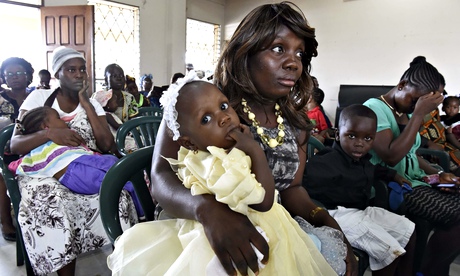
Thousands of children in west Africa have been orphaned by Ebola and are at risk of becoming outcasts from communities frightened of the infectious disease, according to Unicef.
At least 3,700 children in Guinea, Liberia and Sierra Leone have lost one or both parents to Ebola since the outbreak began, says Unicef, which predicts the numbers will double by mid-October.
“Thousands of children are living through the deaths of their mother, father or family members from Ebola,” said Manuel Fontaine, Unicef’s regional director for west and central Africa. “These children urgently need special attention and support, yet many of them feel unwanted and even abandoned. Orphans are usually taken in by a member of the extended family, but in some communities the fear surrounding Ebola is becoming stronger than family ties.”
Unicef, the UN children’s agency, is training health and social workers to support children in affected countries. In Sierra Leone, more than 2,500 Ebola survivors – who are now immune to the disease – will be trained to provide care and support to quarantined children in treatment centres. The organisation is also working with partners to reunite separated children with their relatives through a nationwide family-tracing network, which also provides children with psychosocial support.
“Ebola is turning a basic human reaction like comforting a sick child into a potential death sentence,” Fontaine said. “The vast majority of the children affected by Ebola are still left without appropriate care. We cannot respond to a crisis of this nature and this scale in the usual ways. We need more courage, more creativity, and far far more resources.”
As of 26 September, 6,553 people had been infected with Ebola in west Africa, of whom 3,083 have died. The true death toll is thought to be higher – 70% rather than 50% – when those who had not been admitted to hospital are included. Although there is no effective treatment, rehydration and good care gives people a better chance of survival.
Efforts are under way to build more treatment centres and train more nursing staff.
International volunteers are heading to west Africa in significant numbers to support the fight against Ebola. Cuba has promised 300 doctors and nurses.
There have been 400 volunteers from the NHS, who will have to be approved and trained before they can fly to affected areas.
